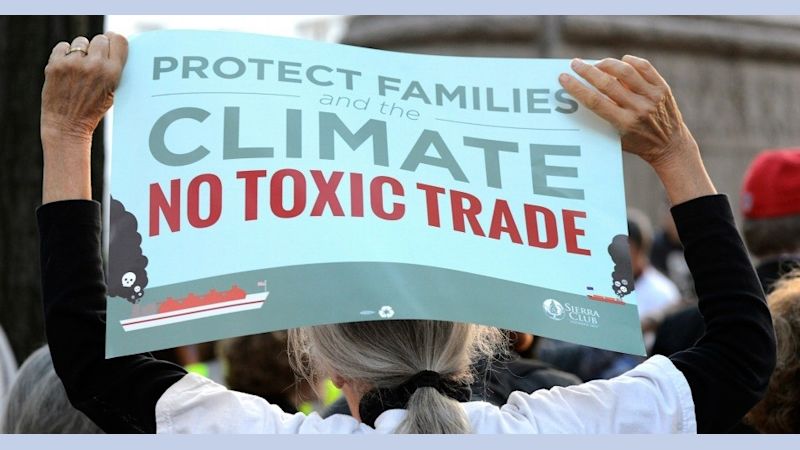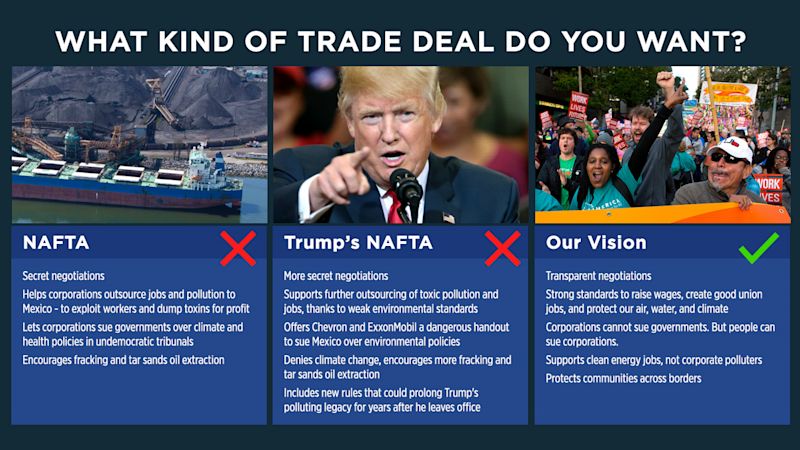Campaign News
Fair Trade and My Position on Trump's USMCA (NAFTA 2.0)

My opponent, Bill Foster, voted to support Trump’s NAFTA 2.0 along with other democrats and republicans. I would have voted against Trump's NAFTA deal because it will only exacerbate the climate crisis. I would have stood with these environmental groups: 350.org, Earthjustice, Food and Water Action, Friends of the Earth, Greenpeace, League of Conservation Voters, Natural Resources Defense Council, Oil Change International, Sierra Club, and Sunrise Movement.
It perpetuates the offshoring of toxic waste and the outsourcing of jobs, creates incentives for more pipelines like the Keystone XL pipeline, and allows big oil companies to challenge environmental protections through a corporate tribunal process known as ISDS.
This trade deal does little to address the climate crisis and fails to even mention the words, “climate change." At least 10 national environmental groups are opposing Trump’s NAFTA 2.0 because the legislation is worse than the original NAFTA with respect to our climate.
The environmental concerns of NAFTA 2.0 are very real. This deal allows corporate polluters to dodge climate and environmental policies in the United States by outsourcing tightly regulated businesses like battery recycling.
The highly controversial Investor State Dispute Settlement (ISDS) process that allows corporations to sue a sovereign government over lost profits due to increased environmental standards remains intact for fossil fuel companies. Unfortunately, this means that oil companies like Shell or Exxon Mobile can sue Mexico in private tribunals if new environmental policies undercut their government contracts for offshore drilling, fracking, oil and gas pipelines, refineries, or other polluting activities.

The Trump administration’s text included a new “rule of origin” that would make it cheaper for oil corporations to export climate-polluting tar sands oil to the U.S. through dangerous oil pipelines like Keystone XL. The text also failed to include a provision that is needed to preserve the U.S.’s autonomy to determine if gas exports to Mexico and Canada are in the public interest. This provision is necessary to fix NAFTA’s automatic gas export guarantee, which has contributed to a five-fold surge in gas exports to Mexico since 2010, fueling increased fracking in the U.S. and an expansion of controversial cross-border gas pipelines.
As the next representative from Illinois’ 11th district I will make sure that we address the climate crisis in every trade deal. In addition to stricter environmental standards, I will also support the inclusion and expansion of human rights, women’s rights and strong, enforceable worker’s rights standards. NAFTA 2.0 makes small strides forward with labor standards. However, while these baby steps need to be recognized, I still have serious questions about how labor standards will be enforced on factory floors. Regardless, NAFTA 2.0 remains damaging to the environment despite these modest gains.
The deep irony here is that in the past, my opponent has used fossil fuel industry talking points and defined climate change as a “global problem," rather than addressing the problems right here at home in the U.S. Specifically, he has singled out other carbon-polluting nations like India and China as a way of dismissing the need for serious climate action by the United States Congress. The best way for the U.S. to influence the climate policies of other nations is through trade agreements like USMCA. Bill Foster cannot talk out of both sides of his mouth by criticizing other nations and then voting for a trade agreement that makes the climate crisis worse.
This trade agreement is far from being a “template” for future trade agreements. It represents the a starting place and there is still much work to be done.
Foster’s vote for NAFTA 2.0 further solidifies that there is only one climate candidate in the race for Illinois’ 11th Congressional District. Her name is Rachel Ventura.
